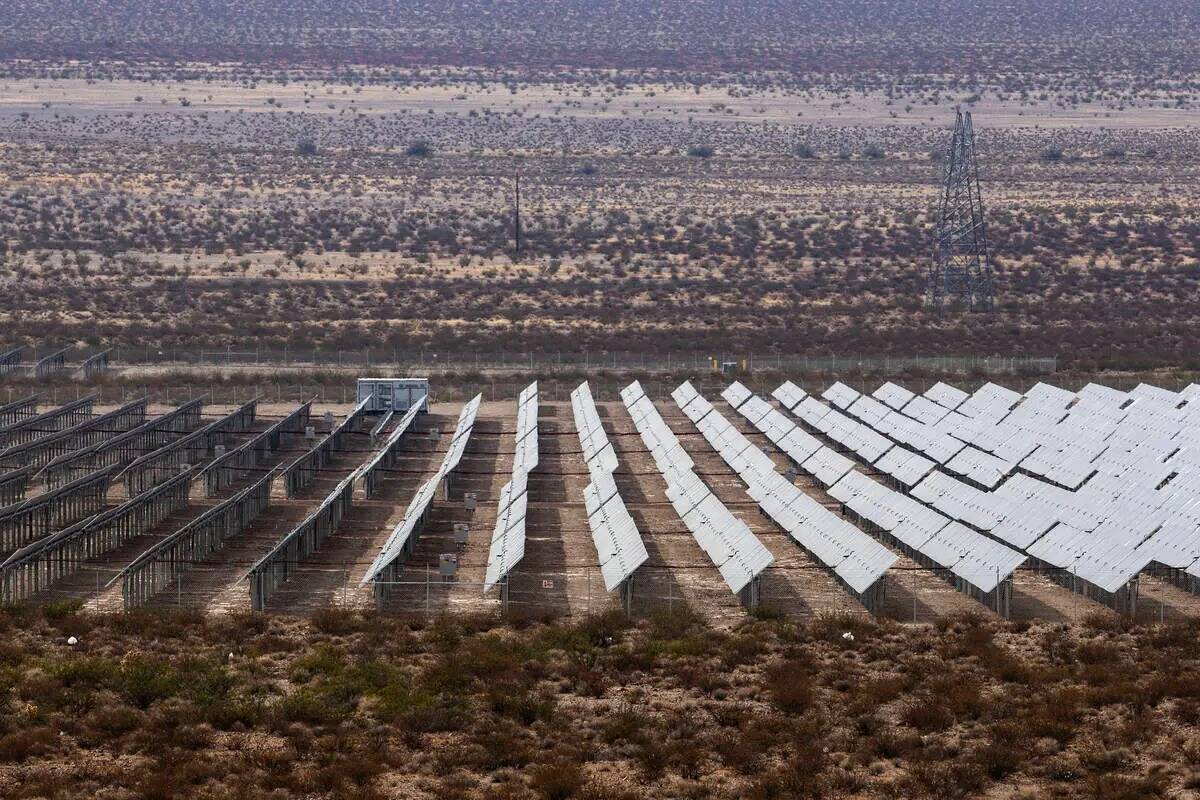NV Energy adds 7,000 acres to existing Nevada solar farm
More desert land is planned to be used for solar farms by NV Energy, as the utility was the winning bidder for two parcels at a federal auction this week.
The utility’s winning bids — giving NV Energy the right to develop on, but not own, the land — totaled $81.9 million for two parcels, encompassing 7,226 acres in Nye County. The parcels, which are controlled by the Bureau of Land Management, are located within the Amargosa Valley solar energy zone, about 11 miles south of the town of Beatty and next to U.S. Highway 95, according to a news release from the U.S. Department of the Interior.
The land will help NV Energy meet the state goal of generating 50 percent of its energy from renewable sources by 2030, Meghin Delaney, media relations manager for NV Energy, said. She said the utility took part in the auction since it’s challenging to find land suitable for large-scale solar development in Nevada.
“Approximately 80 percent of land in Nevada is federally owned, which limits the amount of opportunity to find suitable land that is large enough for utility development while having limited impacts on cultural and natural resources,” Delaney said in an emailed statement.
There is a lot of interest in developing utility-scale energy projects on federal land in Nevada, as the BLM is currently considering over 30 proposed developments in the state, according to a BLM spokesperson.
Amargosa officials were hopeful that NV Energy would win the bid over would-be out-of-state developers.
“My prayer, literally, is that they win,” Amargosa Town Advisory Board Chair Carolyn Allen said at a town meeting in Beatty in June, ahead of the auction.
Allen said that NV Energy was the only developer that had engaged in talks with the community about their plans and she liked that any power generated by the project would stay in the state.
“This is energy for Nevada,” she said, “And I prefer to work with somebody in Nevada.”
The solar energy zone in the Amargosa Valley was one of five zones in Nevada designated by the BLM in 2012 as areas “well suited” for utility-scale solar production. The BLM is working on updating its designations for solar energy zones and could add more zones to Nevada and other states, according to the news release.
NV Energy is in the process of developing timelines for building solar farms on the new parcels but construction could be “accelerated” compared to other energy projects located on BLM land since the property is in a solar energy zone, Delaney said.
The utility estimates solar farms on these parcels could add one gigawatt of energy to its energy load. The U.S. Department of Energy estimates that one gigawatt can power 100 million LED light bulbs.
NV Energy would eventually recover the $81.9 million it spent on the parcels from Nevada ratepayers. The utility plans to recover the costs of securing the land once development on the parcels begins, Delaney said.
Other parcels at auction
Besides the land leased by NV Energy for development, two other entities picked up smaller parcels, both in the Amargosa Desert but outside of the Amargosa Valley solar energy zone.
NextEra Energy Resources paid $21 million to lease a 10,129-acre parcel and Silver Star Solar paid $2.3 million for a 6,320-acre parcel. Since both of these parcels are outside the solar energy zone the winning bidders will need to submit a right-of-way application and development plan to the BLM.
The Department of the Interior touted the lease of the four parcels, totaling $105.2 million, as a win for renewable energy development since the millions placed in bids show demand to get projects started and a step forward for placing renewable energy generation on public lands.
“This record-breaking auction for solar energy development is further evidence that the demand for clean energy has never been greater,” Interior Secretary Deb Haaland said in a statement. “The technological advances, increased interest, cost-effectiveness, and tremendous economic potential make these projects a reliable path for diversifying our nation’s energy portfolio.”
It is estimated that once developed, all four parcels of land could support the addition of three gigawatts to the energy grid.
Contact Sean Hemmersmeier at shemmersmeier@reviewjournal.com. Follow @seanhemmers34 on Twitter.

















